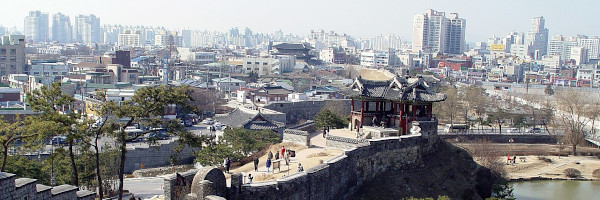The mobile Edge Smart City Platform
Jump to navigation
Jump to search
| The mobile Edge Smart City Platform | |
|---|---|

| |
 Hwaseong Fortress and the skyline of Suwon | |
| Team Organizations | DELI-i Co.LTD |
| Team Leaders | Jeong jongmo |
| Participating Municipalities | Suwon City Korea |
| Status | Ready for Public Announcement |
| Document | None |
Description
Key Deliverables
- New environmentally conscious smart city “Mobile Edge cloud-based AI platform and services” plans by upgrading used smartphones and tablet PCs to IoT things that not use anymore and kept in drawer.
- One old smart device is upgraded to IoT things and integrates with various smart services (e.g. smart transportation signals, floor type smart phone crosswalk signals, smartphone digital multi advertisement signage) communication and other edge services to Suwon city and Sejong city in Korea.
Challenges
Over the past 10 years, as 7 billion smartphones have been produced, new smartphones have been replaced in less than 2 years, smart devices such as used smartphones have been disposed of or placed in drawers.
Solutions
- Rather than producing new IoT that is essential for smart city, waste phone is upgraded to solve environmental problems and global environment pollution problems due to urban electronics contamination.
- Suwon City and Sejong City are planning to invest more than $50 million to transform their city into a smart city infrastructure, but they are limited in finding new models due to the increased cost of IoT devices and communication.
- To overcome this, it is possible to up-cycle waste cell phones into things, develop an edge device between thing-thing and edge cloud platforms, and distribute the existing centralized data center as an edge unitan alternative method of Smart city.
Major Requirements
- Institute smart city that up-cycled smart phoneenvironment and prepare a model for low-cost/ high-efficiency environment through business agreement with Suwon City and Sejong City.
- Verification of a new approach to smart city model with an up-cycling mobile edge smart city platform for smart city digital innovation.
- Up-cycle to IoT things using old cell phone of Samsung Electronics, a Korea representative company, develop service interface that enable to apply city's point of view(provincial city and non-preference city) not a specific service via connected with edge cloud platform AI object recognition and analytics, environment sensing via CCTV camera the unique function of the phone.
- Set up a POC site in Suwon and Sejong City to demonstrate the simultaneous implementation of environmental, safety and parking information in home safety services, underground spaces (e.g. parking lots, underground passages, etc.)
- Implementation of privately-driven Smart City through the formation of private, institutional and regional consultative body to expand to various cities in South Korea.
- Efforts to smart city conferences, such as GCTC about the global environmentand to transform smart cities into environments that recycle resources.
Performance Targets
| Key Performance Indicators (KPIs) | Measurement Methods |
|---|---|
|
|
Standards, Replicability, Scalability, and Sustainability
- Public data is data managed data created or acquired by a public institution and can be apply as new service model that delivered to and combined with the required private sector in a variety format. (as file, open API, other visual materials)
- For this, carrying devise stratagem of various public data, such as local governments and public organizations, can be implemented in conjunction with an up-cycling mobile edge platform based on open API.
- When the up-cycling industry for used digital products is activated by a public institution, it can also increase the affinity (greater accessibility) to the used products and expanding other industries.
- Establish strategies to spread the platform-based service model to other areas, cities and regions.
- Leading the digital innovation industry by continuing to spread up-cycling based smart city services.
- Evaluate the progress and performance of projects regularly to consider measures to recognize outstanding urban and regional programs or reward them with appropriate incentives
- Installation and use of waste smart phones at intersections (one by direction) for black boxes to maximize the impact of resource utilization, reuse,improved traffic congestion and reinforce safety due to collected data.
Cybersecurity and Privacy
Providing data confidentiality and integrity by applying Secure Socket Layer(SSL)/Transport Layer Security(TLS) standard network security protocol for mutual certification in order to prepare cyber security and cracking between in a number of IoT devices and edge computing’s connection environment though mobile up-cycling.
Impacts
- Economic ripple effect: The total cost of deployment is approximately $25,000 for installing and servicing a single CCTV, but the monthly cost of maintenance and operator charge is$3,000, so total it required $28,000 per install, but it can be saved approximately $24,200 considered old cell phone’s first price $800.
- In China, an estimated $800x 80 million units of used smart phones each year would save approximately $64 trillion.
- Since about 20 types of metallic materials such as gold, silver, rare earth, and palladium are used for the smartphone, it is capable of collecting and recycling about 60 billion plastic waste parts.
- Industrial ripple effects: the rise of used smart phones and the focus of the Internet of Things platform, and the presentation of new Internet models can have a significant impact on the development of the connected industries such as smart city.
- Social ripple effects: When the operating system for digital products such as mobile phones, used mobile phones and tablet PCs is activated, it can change the basic negative perception of used products by citizens.
Demonstration/Deployment
- Introducing a new concept of smart city through the creation of social value for old cell phones
- Plan to implement smart city by recycling waste cell phones
- Describe the case for Samsung Electronics and DELI-i Up-cycling services